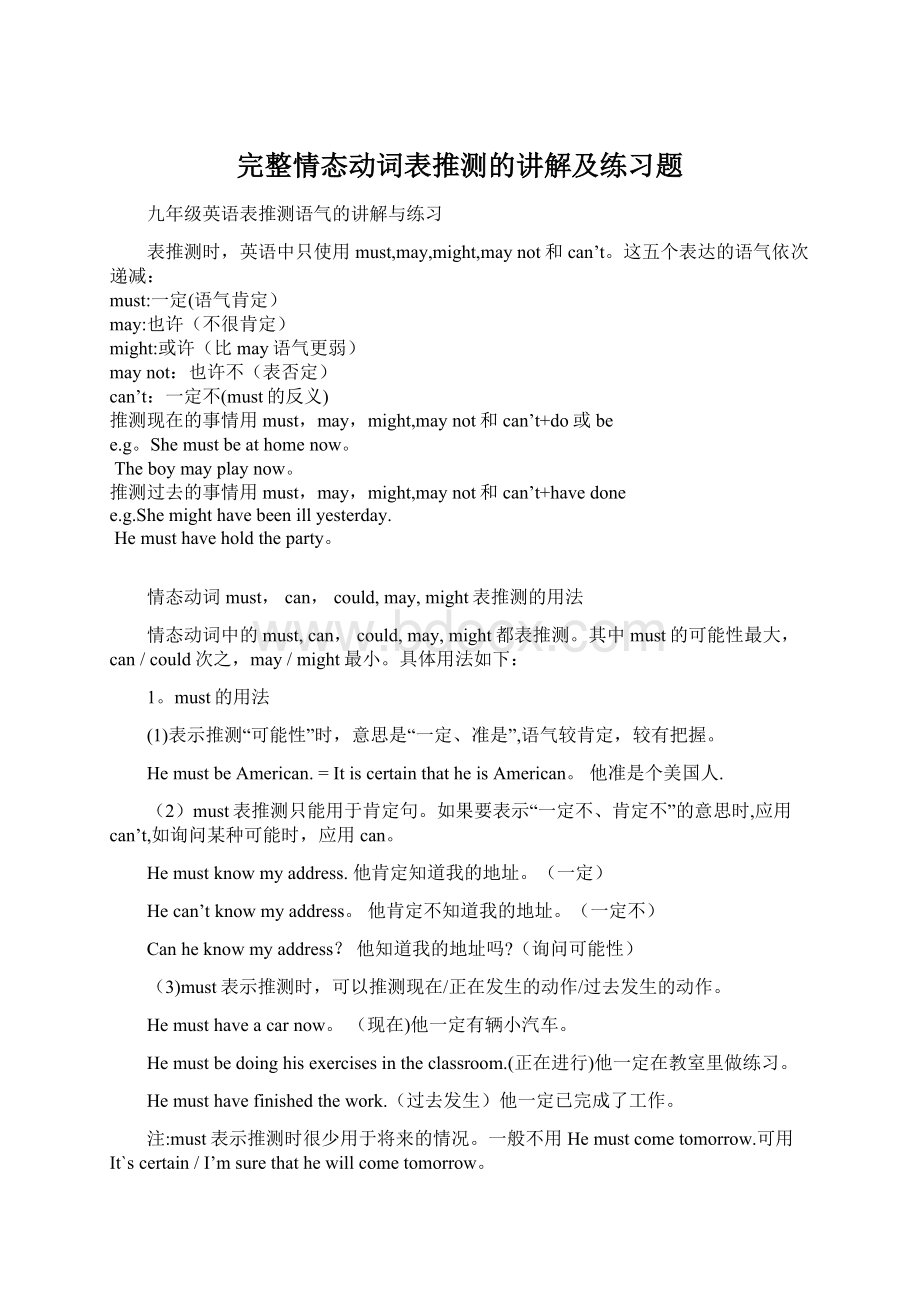 完整情态动词表推测的讲解及练习题Word文档下载推荐.docx
完整情态动词表推测的讲解及练习题Word文档下载推荐.docx
- 文档编号:19418346
- 上传时间:2023-01-06
- 格式:DOCX
- 页数:9
- 大小:22.11KB
完整情态动词表推测的讲解及练习题Word文档下载推荐.docx
《完整情态动词表推测的讲解及练习题Word文档下载推荐.docx》由会员分享,可在线阅读,更多相关《完整情态动词表推测的讲解及练习题Word文档下载推荐.docx(9页珍藏版)》请在冰豆网上搜索。

他肯定不知道我的地址。
(一定不)
Canheknowmyaddress?
他知道我的地址吗?
(询问可能性)
(3)must表示推测时,可以推测现在/正在发生的动作/过去发生的动作。
Hemusthaveacarnow。
(现在)他一定有辆小汽车。
Hemustbedoinghisexercisesintheclassroom.(正在进行)他一定在教室里做练习。
Hemusthavefinishedthework.(过去发生)他一定已完成了工作。
注:
must表示推测时很少用于将来的情况。
一般不用Hemustcometomorrow.可用It`scertain/I’msurethathewillcometomorrow。
(4)在反意疑问句中,当附属部分含有表示推测意义的must时,疑问部分的助动词应与must后面的动词在非推测情况下的用法保持一致。
Hemustbeaworker,isn’the?
(现在)他准是个工人,是吗?
Itmusthaverainedlastnight,didn'
tit?
(过去)昨晚一定下雨了,是不是?
YoumusthavelearnedEnglishformanyyears,haven'
tyou?
(完成时)你一定学了好多年英语,是吗?
2.can/could的用法
(1)can表示推测“可能性”时,往往用于否定句或疑问句。
Can’t“一定不”,语气很肯定。
can在疑问句中意思是“会、可能”.用于肯定句时,表示理论上的,潜在的可能性(有倾向,实际上未必会发生或者不涉及实际是否发生)往往与sometimes或者someone有关。
Accidentscanhappen.
Hecan’tbeathome。
=Itisimpossiblethatheisathome。
他一定不在家。
(2)can/can’t后可接进行时/完成时,表示对现在发生的动作或过去发生的动作进行推测。
Theycan’tbereadinginthelibrary.他们一定不在图书馆读书。
Hecan’thavegonetoShanghaiforIsawhimaminuteago。
他不可能去了上海,我刚才还看见他。
It’ssolate。
Wherecanshehavegone?
天晚了,她可能去哪儿了呢?
(3)在反意疑问句中,当陈述部分含有表示推测意义的can’t时,疑问部分的助动词应与can'
t后面的动词在非推测情况下的用法保持一致。
Hecan’tbeateacher,ishe?
他不是教师,是吗?
Shecan’thavefinishedherhomework,hasshe?
她一定没有完成家庭作业,是不是?
could可用于表示某事有可能发生表示可能性不大的推测。
意思相当于may/might
Don’teatit。
Itcouldbepoisonous。
不要吃它,可能有毒。
Theplanecouldbedelayedbyfog。
飞机可能会因为雾晚点。
(5)could还可以用于表示客气、委婉、礼貌的请求语气。
Excuseme,couldyoutellmethewaytothebusstation?
Couldyouhelpme?
(6)couldn’t表示否定推测,表示某事不可能真实,或由于特定事实或环境某事肯定不会发生。
Itcouldn’tpossiblybepoison。
这不可能是毒药.
表示对过去发生的事推测,常常和havedone连用
Hewasnotathomelastnight。
Hecould/mighthavegonetomovies。
Ididn'
tseeheratthemeetingyesterday;
shecouldn'
thavespokenatthemeeting.
3。
may和might的用法
(1)may,might表示推测“可能性”时,意思是“可能”、“也许”,语气没有must肯定。
Hemay/mightbeAmerican。
=ItispossiblethatheisAmerican.
他可能是个美国人。
注:
might不表示过去时态,只是语气上比may更委婉,表示的可能性更小。
(2)may,might表推测时,可以用于否定句,意思是“可能不、也许不”,但不用于疑问句。
Hemay/mightnotbeathome。
他也许不在家。
(3)may,might可以推测现在正在发生的动作或过去发生的动作。
Hemay/mightbesleepingnow。
(现在)他可能正在睡觉.
Theboymay/mightnotbewatchingTVathome.(现在)
这个男孩可能没在家看电视
Thesestudentsmay/mighthaveseenthefilmbefore.(过去)
这些学生以前可能看过这部电影。
(4)may,might还可以推测将来的情况。
Ithinkweshouldtakeraincoatwithus,itmayrain.
我想我们应该带上雨衣,可能要下雨了。
Shemightnotcomethisafternoon.她今天下午可能不来
(一)情态动词表推测的三种句式
能用于表推测的情态动词:
must,can,could,will,would,may,might,should,oughtto
1.在肯定句中一般用must(一定),may(可能),might/could(也许,或许)。
(1)Hemust/may/mightknowtheanswertothisquestion?
他一定/可能/也许知道这个问题的答案.
(2)Itiscoldintheroom。
Theymusthaveturnedofftheheating.
屋里很冷,他们肯定把暖气关了。
2。
否定句中用can’t/couldn'
t(不可能),maynot/mightnot(可能不)。
(1)Itcan’t/couldn’tbetheheadmaster。
HehasgonetoAmerica.
这不可能是校长,他去美国了.
(2)Hemaynot/mightnotknowthescientist.
他也许不认识那位科学家。
3。
疑问句中用can/could(能……?
)。
(1)Couldhehavefinishedthetask?
他可能把任务完成了吗?
(2)Canhebeathomenow?
他现在能在家吗?
注:
以上三种句式中情态动词的语气按程度都是依次递减的。
Might,could并非may,can的过去式,而表示语气较为委婉或可能性较小。
(二)情态动词表推测的三种时态
对将来情况的推测,用“情态动词+动词原形”.
(1)Shemust/may/might/couldarrivebefore5。
5:
00前她一定/可能/也许到。
(2)Shemust/may/might/couldwalkmilesandmilesamongthehillswithoutmeetinganyone. 她一定/可能/也许会在山里一连走好几英里而遇不到一个人。
2.对现在或一般情况的推测,用“情态动词+be"
,“情态动词+bedoing"
或“情态动词+动词原形”。
(1)Hemust/may/might/couldbelisteningtotheradionow.
他一定/可能/也许正在听收音机。
(2)Hecan’t(couldn’t)/may(might)notbeathomeatthistime.
这个时候他不可能/可能不在家。
(3)Mr.Bushisontimeforeverything.Howcan(could)hebelatefortheopeningceremony?
布什先生一向准时,这次开幕式他怎么可能迟到呢?
3.对过去情况的推测,用“情态动词+have+过去分词”.
(1)Itmust/may/might/couldhaverainedlastnight.Thegroundiswet.
地湿了,昨晚肯定/可能/也许下雨了。
(2)Thedoorwaslocked.Hecan(could)not/may(might)nothavebeenathome。
门锁着,他不可能/可能不在家。
(3)Can/Couldhehavegottenthebook?
难道他找到书了吗?
注:
情态动词should/oughtto表推测时,意为“想必会,理应……”但与“have+过去分词”连用时,则又可构成虚拟语气意为“本应该做某事却没做”。
例如:
(4)It'
sseveno’clock。
Jackshould/oughttobehereatanymoment。
现在七点钟了,杰克理应随时到达.(推测)
(5)Sheshould/oughttohaveattendedyourbirthdayparty,butshehadtolookafterhermotherinhospital.(虚拟)
她本该出席你的生日晚会的,可是她得在医院照顾她妈妈。
(6)Tomshouldnot/oughtnottohavetoldmeyoursecret,buthemeantnoharm.(虚拟)汤姆本不该告诉我你的秘密,可是他并无恶意。
补充强调:
推测的句型特点(对某一次的推测句型有两部分:
语气和时态)
(1)语气部分:
(以下情态动词语气由强至弱)
肯定句:
must、may、might(=could)
否定句:
can’t(=couldn’t)、mayn’t、mightn'
t
疑问句:
can、could(语气更加委婉不确定)
(2)时态部分:
be表示对现在的推测havedone表示对过去的推测
bedoing表示对正在进行的推测
◆语气部分写在前时态部分写在后,组合在一起就是推测
(三)几组表推测的情态动词用法
“情态动词+完成时”是历年高考的热点,在做此类练习时,既需要掌握这一结构的基本用法,又应该仔细体会题干所提供的语言信息,准确理解语言环境和说话人的含义,尤其要注意题干中时态给予的暗示。
musthavedone表示对已经发生的事情的推测,意为“一定,想必”,句子中表示的是一种肯定的推测。
这种结构一般只用于肯定句,其否定形式是can’t(couldn’t)havedone,表示“不可能,肯定不会"
。
Hedidn'
thearthephone。
Hemusthavebeenasleep。
他没有听到电话响,他肯定是已经睡着了.
HemusthavebeentoShanghai.他一定去过上海。
Theycan’thavegoneout,becausethelightison.他们不可能出去,因为灯亮着。
2.can(could)havedone表示对过去的时间内可能发生的事情的猜测,canhavedone一般只用于否定句和疑问句.couldhavedone还可以用于肯定句,常用来表示本来可能完成而实际未完成的动作。
Hecan’thavefinishedtheworksosoon。
这项工作他不可能完成得这样快。
Wecouldhavewalkedtothestation,itwassonear。
我们本来是可以走到车站去的,路很近。
3.may(might)havedone
(1)表示对已经发生的事情的不太肯定的推测,意为“可能已经,或许已经"
(2)虚拟用法表示本可以做,但却没做(表示很委屈地责备)
Ifwehadtakentheotherroad,wemighthavearrivedearlier。
如果我们选择另一条路,我们可能会到得早一些。
Hemighthavegivenyoumorehelp,hewasverybusy.
他本来是可以给你更多帮助的,尽管他很忙。
4。
needn’thavedone指实际上做了本来不必要做的事,意为“本来不必”。
Therewasplentyoftime。
Sheneedn'
thavehurried.
时间很充裕,她本不必匆忙.
Youneedn’thavetoldhimthenews.
他本来不必把这个消息告诉他。
5。
should(oughtto)havedone指本该做而实际未做的事,意为“本来应该”。
其否定式shouldn’t(oughtn'
t)havedone则表示某种行为不该发生但却发生了.例如:
Youshouldhavestartedearlier,butyoudidn’t.
你本应该早一点出发,但是你没有。
Yououghttohavehelpedhim(butyoudidn’t)。
你本应该帮助他.
Weshouldn’thavewaitedforherbecauseshenevercame。
我们本不应该等她,因为她根本不会来。
6.Wouldhavedone本想做(却没做)wouldn'
thavedone本不想做(却做了)
Iwouldhavehelpedyou,butIwastoobusy.
我本想帮你,但我太忙了.
小试牛刀
一、单项选择
1John___cometoseeustonight,butheisn'
tverysureyet。
A.mayB.needC。
can’tD.must
2Johnisn’tintheclassroom.HeplaysoccerontheplaygroundwithBob。
A.canB。
mustC.shouldD。
can'
t
3That_______notbeherhusband.Sheisstillsingle。
A。
mayB.canC.couldD。
might
4You___goandseeadoctoratoncebecauseyougotafever.
canB.mustC.dareD.would
5-CanyouspeakJapanese?
—No,I____.
A.mustn’tB。
tC。
needn’tD。
maynot
6—He___beintheclassroom,Ithink。
—No,he___beintheclassroom。
Isawhimgohomeaminuteago.
A.can;
maynotB.must;
maynotC.may;
tD。
may;
mustn’t
7—IsLenaswimminginthepool?
—No,sheswim。
Sheisterrifiedofwater。
A。
maynotB。
mustnotC.can’tD。
needn’t
8Heisn'
tatschool.Ithinkhe___beill。
canB。
shallC。
mustD.might
9-Whatdoyouthink“upset”means?
-I'
mnotsure.Itmean“sad"
mayB。
mustC.canD。
should
10Thechildren___playfootballontheroad.
A.can'
tB。
canC.mustn'
tD.must
11.Theroadiswet。
It______lastnight.
A.mustrainB。
musthaverained
C.couldhaverainedD.canhaverained
12.He______youmorehelp,eventhoughhewasbusy.
AmighthavegivenBmightnotgive
CmaynothavegivenDmaygive
练一练
Look!
Thelightisoutinherroom。
She——--tobedalready.
mustgoB.hadtogoC.musthavegoneD。
hasgone
2.Wehadawonderfultimeyesterday.You——-—.Whydidn'
tyoucome?
A.hadtocomeB.shouldhavecomeC。
mighthavecomeD。
musthavecome
3.─Therewerealreadyfivepeopleinthecarbuttheymanagedtotakemeaswell。
─It______acomfortablejourney.
A.can’tbeB.shouldn'
tbeC.mustn'
thavebeenD.couldn'
thavebeen
4.MysistermethimattheGrandTheatreyesterdayafternoon,sohe___yourlecture。
A.couldn’thaveattendedB.needn’thaveattended
C.mustn'
thaveattendedD.shouldn’thaveattended
5.Iwasreallyanxiousaboutyou.You_____homewithoutaword.
A.mustn'
tleaveB.Shouldn'
thaveleft
C。
Couldn'
thaveleftD。
needn’tleave
6。
Oh,I’mnotfeelingwellinthestomach,I_____somuchfriedchickenjustnow。
shouldn’tcutB。
mustn’thaveeaten
C。
shouldn’thaveeatenD.mustn’teat
7.Mr.White_____at8:
30forthemeeting,buthedidn’t’showup。
shouldhavearrivedB。
shouldarrive
C.shouldhavehadarrivedD.shouldbearriving
8。
You______betired—you’veonlybeenworkingforanhour.
A.mustnotB.won’tC.can’tD.maynot
9.-Isn’tthatAnn’shusbandoverthere?
—No,it_______behim—I’msurehedoesn'
twearglasses。
A.can’tB.mustnotC.won’tD.maynot
10.There____beanydifficultyaboutpassingtheroadtestsinceyouhavepractisedalotinthedrivingschool。
A.mustn’tB。
shan’tC.shouldn’tD。
needn’t
11。
Iwasonthehighwaywhenthiscarwentpastfol
- 配套讲稿:
如PPT文件的首页显示word图标,表示该PPT已包含配套word讲稿。双击word图标可打开word文档。
- 特殊限制:
部分文档作品中含有的国旗、国徽等图片,仅作为作品整体效果示例展示,禁止商用。设计者仅对作品中独创性部分享有著作权。
- 关 键 词:
- 完整 情态 词表 推测 讲解 练习题
 冰豆网所有资源均是用户自行上传分享,仅供网友学习交流,未经上传用户书面授权,请勿作他用。
冰豆网所有资源均是用户自行上传分享,仅供网友学习交流,未经上传用户书面授权,请勿作他用。


 铝散热器项目年度预算报告.docx
铝散热器项目年度预算报告.docx
